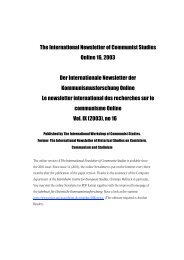VOL. XVI (2010), NO 23 - The International Newsletter of Communist ...
VOL. XVI (2010), NO 23 - The International Newsletter of Communist ...
VOL. XVI (2010), NO 23 - The International Newsletter of Communist ...
Sie wollen auch ein ePaper? Erhöhen Sie die Reichweite Ihrer Titel.
YUMPU macht aus Druck-PDFs automatisch weboptimierte ePaper, die Google liebt.
<strong>The</strong> <strong>International</strong> <strong>Newsletter</strong> <strong>of</strong> <strong>Communist</strong> Studies Online <strong>XVI</strong> (<strong>2010</strong>), no. <strong>23</strong> 46<br />
<strong>The</strong> notion <strong>of</strong> biography used in this study is based on three essential premises: First, life<br />
courses have to be distinguished from biographies. 17 Second, biographies are inextricably<br />
linked with memory and retrospective interpretations emerging from socio-cultural<br />
exchanges, i.e. communication. 18 Third, biographical research primarily performs narrative<br />
analysis. 19 Correspondingly, enquiry into biographical data deals with accounts that convey<br />
“pragmatic knowledge” constructed through “ongoing time-space specific encounters with<br />
other (…) actors and bodies <strong>of</strong> knowledge”. 20<br />
<strong>The</strong> ethnography <strong>of</strong> communication “looks at communication from the standpoint <strong>of</strong> interest<br />
<strong>of</strong> a community itself” and considers “its members as sources <strong>of</strong> shared knowledge and<br />
insight.” 21 It is based on the premise that every community has developed a set <strong>of</strong><br />
“linguistically distinguishable settings” 22 that allow a conclusion to be reached about the<br />
structures <strong>of</strong> the group and the social function <strong>of</strong> their communicative performance, in<br />
addition to the underlying social norms and needs. Thus, the ethnography <strong>of</strong> communication<br />
investigates the relation between activities <strong>of</strong> speech and social life by aiming at a “theory <strong>of</strong><br />
language use” <strong>23</strong> . In addition, it assumes that shared linguistic performances <strong>of</strong> a community<br />
or society are historically shaped. Communities are distinguished as to styles <strong>of</strong> speaking<br />
that have to be interpreted in relation to their history. 24 Concerning the history <strong>of</strong> linguistic<br />
competences, facets <strong>of</strong> social change, which frequently occur with the expansion <strong>of</strong> new or<br />
alien practices <strong>of</strong> speaking, are <strong>of</strong> special interest. Social transformations create a climate in<br />
which linguistic routines, conventions and imprints lose their appropriateness25 and<br />
consequently ought to be adjusted. This is especially true if transitions follow a radical<br />
historical break, as in 1989. Philologists and linguists have comprehensively investigated the<br />
relationship between semantic congruence and conflict <strong>of</strong> post 1989 East German. 26<br />
However the connection between language use and social cooperation has been commonly<br />
overlooked.<br />
In his work, linguist anthropologist Dell Hymes clarified that the basic unit <strong>of</strong> analysis is a<br />
community rather than a language. Accordingly, language is not taken as a linguistic system<br />
in its own right but as a social institution. Nonetheless, the study <strong>of</strong> linguistic features goes<br />
beyond a mere content analysis <strong>of</strong> accounts sought to gain insight into the structural and<br />
17 Cf. Gabriele Rosenthal: Erlebte und erzählte Lebensgeschichte. Gestalt und Struktur biographischer<br />
Selbstbeschreibungen, Frankfurt a.M., Campus Verlag, 1995.<br />
18 Harald Welzer: Das kommunikative Gedächtnis. Eine <strong>The</strong>orie der Erinnerung, München, Beck, 2002, p. 222.<br />
19 Cf. Cathrine Kohler Riessmann: Narrative Analysis. Newbury Park-London-New Dehli, Sage Publications, 1993.<br />
(Qualitative Research Methods. 30).<br />
20 Graham Gardner: Unreliable Memories and other Contingencies. Problems with Biographical Knowledge. In:<br />
Qualitative Research 1 (2001), 2, pp. 185-204.<br />
21 Dell H. Hymes: Foundations in Sociolinguistics. An Ethnographic Approach, Philadelphia, University <strong>of</strong><br />
Pennsylvania Press, 1974, p. 8.<br />
22 John J. Gumperz, Discourse Strategies, p. 43.<br />
<strong>23</strong> Dell H. Hymes: Models <strong>of</strong> Interaction <strong>of</strong> Language and Social Life. In John J. Gumperz, Dell H. Hymes (eds.):<br />
Directions in Sociolinguistics, New York, Holt, Rinehart & Winston, 1972, pp. 35-71.<br />
24 Dell H. Hymes, Florian Coulmas: Soziolinguistik. Zur Ethnographie der Kommunikation. Frankfurt a.M.,<br />
Suhrkamp-Taschenbuch-Verlag, 1979, p. 177.<br />
25 Ibid., p. 41.<br />
26 Cf. Patrick Stevenson: Language and German Disunity. A Sociolinguistic History <strong>of</strong> East and West in Germany<br />
1945-2000, Oxford, Oxford University Press, 2002; Manfred W. Hellmann, Marianne Schröder (eds.): Sprache und<br />
Kommunikation in Deutschland Ost und West, Hildesheim, Olms, 2008. (Germanistische Linguistik. 192-194); Armin<br />
Burkhardt, K. Peter Fritsche (eds.): Sprache im Umbruch. Politischer Sprachwandel im Zeichen von „Wende“ und<br />
„Vereinigung“, Berlin-New York, de Gruyter, 1992 (Sprache, Politik, Öffentlichkeit, 1); Ulla Fix, Dagmar Barth (eds.):<br />
Sprachbiographien. Sprache und Sprachgebrauch vor und nach der Wende von 1989 im Erinnern und Erleben von<br />
Zeitzeugen aus der DDR. Inhalte und Analysen narrativ-diskursiver Interviews, Frankfurt am Main, Lang, 2000.<br />
(Leipziger Arbeiten zur Sprach- und Kommunikationsgeschichte. 7).














